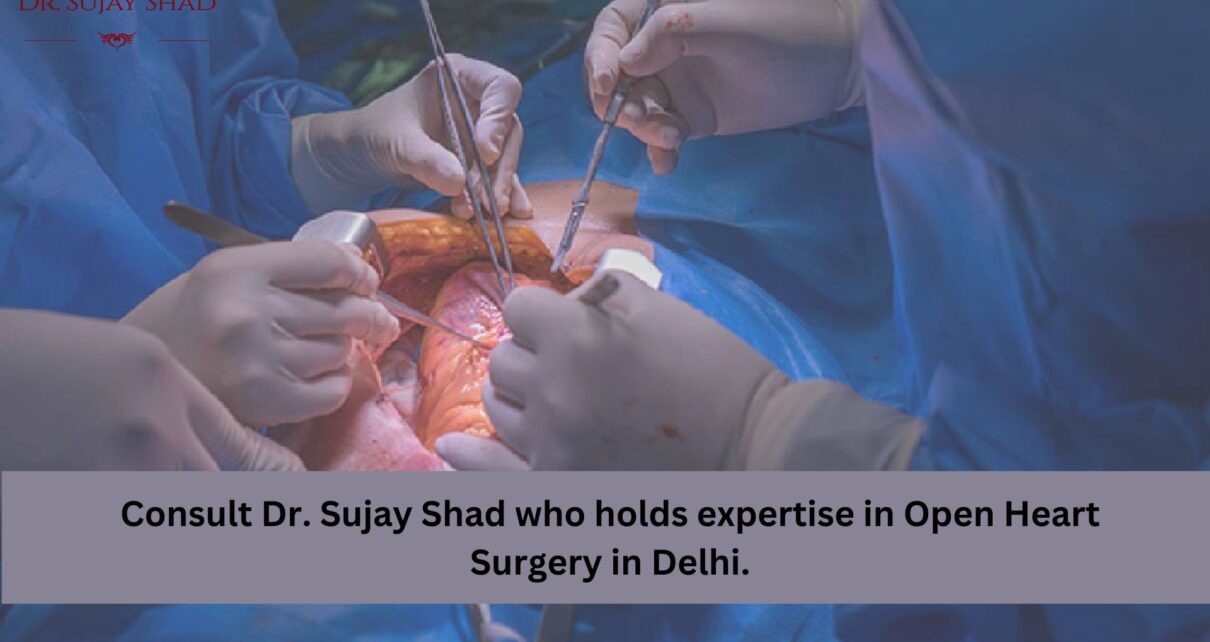Open-heart surgery is a complex medical intervention aimed at treating a wide range of heart conditions. It is an invasive procedure associated with coronary artery disease, heart valve disease, congenital heart defects, aortic aneurysms, heart tumors, and more. This critical procedure involves the assessment of the heart by opening the chest, which can not be possible through non-invasive means. Dr. Sujay Shad, a senior heart surgeon and also an expert in Open Heart Surgery in Delhi at Sir Ganga Ram Hospital shares about the most common conditions in which open-heart surgery is performed. Read on for more details:
1. Coronary Artery Disease (CAD)
Coronary artery disease, also called ischemic heart disease, is one of the most critical diseases that leads to death among millions of people worldwide. The arteries supply oxygen-rich blood to the heart muscles. Coronary artery disease occurs due to an insufficient supply of oxygen to the heart muscles as the coronary artery becomes narrowed or blocked. It results in the buildup of fatty deposits, leading to heart attacks or heart failure. There are numerous reasons for coronary artery disease. This includes high cholesterol levels, hypertension, diabetes, and poor lifestyles.
The main cause that increases the risk of coronary heart failure is atherosclerosis, where increased levels of cholesterol, fats, and low density of lipoprotein buildup on the arterial walls fracture and contribute to plaques. Chest pain, known as angina, shortness of breath, and myocardial infarction (heart attack) are the common symptoms of coronary artery disease. The best solution for complex blockages or multiple blocked arteries is Coronary Artery Bypass Grafting (CABG).
It is a surgical process used to improve the blood flow to the heart where surgeons open the heart to assess the heart and create a new route for blood to flow. The surgeon harvests the healthy blood vessels from other parts of the body, usually from the leg or arm, and attached to the blocked coronary arteries.
2. Heart Valve Disease
Heart valve disease is one of the reasons that causes open-heart surgery. The mitral, tricuspid, aortic, and pulmonary are the four heart valves. These valves control the blood flow in and out of the heart’s chambers. The main function of the valves is to flow blood in the right direction. The disruption or damage in the heart valve- leads to stenosis or regurgitation.
a. Aortic valve stenosis- It causes valve replacement surgery. The aortic valve flows the blood from the heart to all parts of the body. Aortic valve stenosis is a heart valve disease where the aortic valve becomes too narrow, which restricts the flow of blood. This causes severe heart issues such as chest pain and fatigue that need open-heart surgery to replace the valve.
b. Mitral Valve Regurgitation- This is another severe case that is responsible for open-heart surgery. In these heat issues, blood moves backward into the left atrium due to the improper valve closure. This results in the leakage of blood, leading to fatigue, chest pain, palpitations, and shortness of breath. Valve Repair is the most preferable method to solve heart valve disease.
3. Congenital Heart Defects
Congenital heart defects are structural abnormalities in the heart that are present from birth. Some congenital heart defects are atrial septal defect, ventricular septal defect, and transposition of the great arteries.
a. Atrial Septal Defects (ASD) and Ventricular Septal Defects (VSD): These defects stand out because of small holes in the septum or a wall that separates the heart’s chambers. This results in the abnormal flow of blood between the heart’s chambers. Open-heart surgery plays a significant role in restoring treatment by closing the holes and restoring normal blood flow.
b. Transposition of the Great Arteries (TGA): Reversed two arteries (the pulmonary artery and the aorta), leading to abnormal blood flow. Open-heart surgery corrects the position of the arteries and supports normal blood flow.
4. Aortic Aneurysm and Dissection
The aorta is the largest artery in the body that supplies oxygenated blood from the heart to all parts of the body. An aortic aneurysm is the major concern that occurs due to the abnormally enlarged or weakening of the aortic artery. It increases the risk of rupture. A thoracic aortic aneurysm is the type of aortic aneurysm that affects the part of the aorta that is present in the chest, causing excessive internal bleeding if it ruptures.
Dissection is the other aortic issue that needs immediate medical intervention as it causes excess blood loss, organ damage, or even death. Open-heart surgery involves either repairing or replacing the aortic artery with an artificial graft and preventing major issues.
5. Heart Transplant
Heart transplant surgery involves open-heart surgery designed to replace the damaged heart from the donor’s healthy heart. A heart transplant should be considered in situations when the heart fails completely and situations when pumping blood. It happens for several reasons, like ischemic cardiomyopathy, dilated cardiomyopathy, congenital heart defects, and restrictive cardiomyopathy. At Sir Ganga Ram Hospital, Dr. Sujay Shad, and his team for Heart Surgery Doctor in Delhi, provide treatment for all types of heart diseases and conditions.
Visit them for more details!




